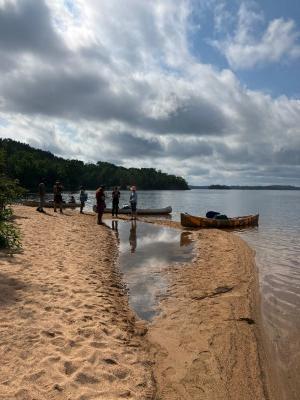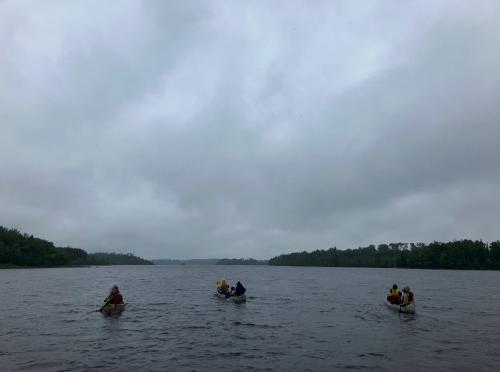Exploring environmental justice in the wild
Nestled deep within the pristine wilderness of Ely, Minnesota, lies the Wilderness Field Station, a haven for nature enthusiasts and a hub for immersive learning. Here, I had the opportunity to take an environmental justice course, which opened my eyes to the intricate web of environmental issues and their impact on communities.
I sat down with two friends and fellow course participants, Lucas Krueger’24 and Ela Heywood’26, and our course instructor, Professor of International Relations and Environmental Studies Pablo Toral, to relive our experiences and insights gained this summer.

Credit: Pablo Toral
The Wilderness Field Station offers a unique opportunity to explore environmental justice in a setting that challenges and reshapes one’s perspective on the world. As I ventured into this remarkable landscape alongside my peers, I discovered that environmental justice demands a profound shift in how we perceive our relationship with the environment and each other.
“In the moment, I would say it was really hard, and there was a lot of mental and physical stress and exhaustion,” Ela says. “But looking back on it, there’s not just a sense of accomplishment from making it through those rough moments, but I learned a lot about myself. I learned that there was a community out there for me to get me through those hard times. When I think back about it, I feel joy.”
Lucas says, “The sense that I had of the WFS is one of inhabitancy: of the past and present, of human and inhuman beings. The world is deep and complicated and profoundly relational, and the landscape and history around the WFS (as well as the people there) is very good at teaching you this. You come to see the history in everyday things: in lichens, patterns of forest growth, physical artifacts left behind: shared memories, reinterpreted by time, and mice, and you. It’s a co-created world — something that you also have a hand in. This is true of here, and there, and everywhere, too.”

Credit: Pablo Toral
It was the world surrounding the field station that set the stage for our exploration of environmental justice. As Pablo explains, the Wilderness Field Station has a unique framework with two missions: wilderness education and applied field research. “It is a place where students learn about and adapt to nature, and each course is designed to introduce students to applied field research methods,” he says. Every course incorporates applied field research, from simulations to hands-on data collection, analysis, and delivery. The program’s unique framework mandates wilderness education and applied research, a blend of wilderness adaptation and academic exploration.
Pablo’s course, called Environmental Justice, stands out as an interdisciplinary powerhouse. It draws from various fields, such as policy, law, ecology, economics, anthropology, history, and more, fostering an environment where students realize the interconnectedness of knowledge across disciplines, ultimately expanding their toolkit to understand the world.
“In terms of academic learning, I felt immensely enriched,” Ella says. “The conversations, the way Pablo orchestrated discussions, and how he navigated us to different destinations is important. It felt cohesive and teamwork-oriented. It’s important as an American citizen to know about American environmental policies and the history of environmental policies, who put backbreaking labor into protecting the land we have today. I also have a better understanding of Canadian politics and how laws are passed there.”
Lucas shared his thoughts on how this course transformed his understanding of environmental justice. It’s not just a singular concept or cause, he says. It’s about recognizing the violence, both fast and slow, perpetuated against the Earth and its inhabitants, especially Indigenous communities. Environmental justice requires reevaluating the very foundations of our society, including our notions of value, harm, and humanity. The field station’s pristine natural surroundings serve as an ideal backdrop for these discussions.

Credit: Pablo Toral
The Wilderness Field Station experience taught us to embrace vulnerability and uncertainty. Ela recalls, “We each carried canoes for over two miles, sometimes not consecutively. It’s an exhausting toll on your body. There were long portages, bugs, rocks, and that wall Pablo kept talking about for weeks before we got there. It’s unfathomable. The physical exertion was exhausting, but it felt like I was finally using my body for a natural form of labor, like a survival type of labor. Part of it was exhausting, but it was also really empowering.”
The learning aspect of the Wilderness Field Station experience was not limited to academic knowledge. We all found ourselves enriched in survival skills, life lessons, and understanding of ecosystems. “I was kind of scared to take on certain things, especially if they were important. You hesitate to take on certain jobs because you don’t think that you can,” Ela says. “It’s hard to keep delegating different jobs to different people, but there’s that mental hurdle of thinking you don’t have a choice. We’re stuck here, and someone has to do this, and it looks like it’s you.”
Reflecting on the unique environment of the Boundary Waters and the sense of unity that evolved within the group, Ela emphasizes how we transitioned from being strangers to a tightly-knit family. “It’s still hard to wrap my head around months afterward, because I genuinely forgot about the fact that we didn’t know each other before,” Ela says. “Having personal relationships with all of you and having a healthy, strong group dynamic was special, and it’s weird because you would think that you need more than four weeks to get to know people.”

Credit: Pablo Toral
Pablo stressed the importance of understanding that we are far more resilient than we think. By venturing into the unknown, we developed emotional skills to work through discomfort, leading to personal, professional, and academic growth. The field station’s institutional structure provided us with a safety net. While the wilderness seemed daunting, the program equipped us with the skills needed to navigate challenges, turning discomfort into a valuable asset.
In summary, this program doesn’t just challenge your comfort zone; it sprints past it, leaving you breathless and grinning like a caffeine-charged squirrel. It’s a place where the lines between humans, nature, and knowledge get so blurred you’d think you’re at an existential art show. You start as strangers and leave as a tight-knit family. The raw beauty of nature slaps you in the face daily, but you’re too busy carrying canoes and learning about the environment to mind.
You’ll discover more about different parts of the world from the folks you meet here than you ever did in a geography class. And if you’re lucky enough to be in a course led by Pablo, you might just add “Trail Barista” to your resume. He’ll teach you the art of brewing espressos, mochas, and cappuccinos with nothing but a campfire. You’ll also become a pro at keeping your food safe from bears, and you’ll realize that squirrels have a Gorp obsession that’s second to none.
As I look back on my time at the Wilderness Field Station, it’s impossible not to agree with Lucas Kruger’s assessment: This experience is nothing short of “sick” – and I mean that in the best way possible.

Credit: Abhey Guram’24


